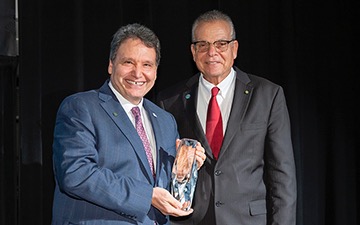Featured image by Emilio Takas via Unsplash.
Stimulus checks from six months ago have dried up, and college graduates are competing with 30 million other unemployed Americans for jobs. The class of Spring 2020 graduated in lockdown as their potential corporate prospects laid off more workers than they hired, due to unprecedented events.
Approximately 81% of college students are struggling financially due to the virus. With an increasingly competitive job market, what should college students expect to see as they graduate amid or after a pandemic? Madeline Zavodny, a UNF Economics professor in the Coggin College of Business, said, “I hate to be the voice of gloom here, but economic studies show that graduating during a recession has pretty long term repercussions for the average college graduate. Your first job can set you up on a path for the next decade.”
However, according to Zavodny, “You’re better off having a degree, then not having a degree. That is essential to understand.”
There’s an itch around the country, especially in Florida, to get the economy restarted again. Just four days ago, Florida Governor Ron DeSantis signed an executive order allowing restaurants and bars in Florida to open back up at full capacity.
Many Americans remain divided on solutions to the pandemic and its long list of ongoing social effects. Zavodny thinks our first solution is a vaccine. She voiced that there’s very little monetary policy that can be implemented in this situation, and while fiscal policy can help people pay their bills short-term, it is by no means a long-term solution.
“We are going to need to pay off all the additional debt that the government is incurring at some point. We need to get a vaccine as soon as possible, so people feel safe going out and so that these jobs return,” Zavodny stated.
According to the Bureau Labor of Statistics, 18.6% of people between the ages of 16-24 are still unemployed. Students are playing guessing games on when this will all blow over.
The Cares Act was passed by Congress and signed into law by President Trump on March 27, 2020. It was a $2 trillion dollar economic relief package to protect the American People from the public health and economic impacts of COVID-19. Many college students were not eligible for the stimulus paycheck provided from the package if they were claimed as a dependent on another person’s tax return.
Many American families and students were unprepared for an event like this in the country. Zavodny said that there were many winners and losers of the Cares Act, but in economic terms, it’s a sunk cost that you can’t go back and get.
“Retrospectively, you could always and think, I wish I would have done – xyz – to do something,” Zavodny said. “I think most families presumably made the right calculation at the time about whether or not to have their college aged child as a dependent. Maybe they were getting some tuition tax benefits, or something like that.”
The Cares Act was a form of complex legislation passed quickly because of the circumstances. Professor Zavodny said that, “One can argue not quickly enough.”
There was aid provided for universities through the Cares Act, such as $14 billion in grants and $6 billion to help students directly impacted by the pandemic. This was money that students had to apply for and colleges distributed accordingly.
“You see tremendous variety in what universities did,” Zavodny said. “My impression of what UNF did was that they took a relatively simple approach in distributing it, and made a pretty good decision.”
Student loan payments have been deferred and interest has been waived on federally student held loans until September 30, 2020. Will this be extended?
Zavodny believes that an extremely divided congress is hindering the process of passing potentially helpful relief efforts. She expressed hope that deferred loan payments are something that congress will extend like they did with eviction moratoriums.
“It’s gonna be tough. It’s a hard road ahead,” Zavodny said.
__
For more information or news tips, or if you see an error in this story or have any compliments or concerns, contact editor@unfspinnaker.com.
















